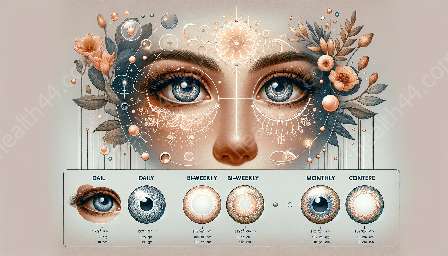Specialty contact lenses cater to a diverse range of specific eye conditions, offering customized solutions for individuals who may not find optimal vision correction with traditional contact lenses. These cutting-edge lenses address conditions such as astigmatism, keratoconus, presbyopia, and more, providing improved vision and comfort.
Types of Specialty Contact Lenses
There are various types of specialty contact lenses, each designed to meet the unique needs of specific eye conditions. These include:
- Scleral Lenses: These large-diameter lenses vault over the cornea and rest on the sclera, beneficial for individuals with irregular corneas, keratoconus, and severe dry eye syndrome.
- Toric Lenses: Specifically designed for individuals with astigmatism, toric lenses have different powers in different meridians to correct the irregular curvature of the cornea.
- Multifocal Lenses: These lenses are used to correct presbyopia, providing clear vision at various distances by incorporating different powered zones within the lens.
- RGP (Rigid Gas Permeable) Lenses: RGP lenses offer high oxygen permeability and are often used for astigmatism, keratoconus, and post-corneal transplant patients.
- Hybrid Lenses: These lenses combine the visual clarity of RGP lenses with the comfort of soft lenses, making them suitable for irregular corneas and challenging refractive errors.
- Piggyback Lenses: This approach involves wearing a soft lens underneath a gas permeable lens, providing improved comfort for individuals with irregular corneas or sensitive eyes.
Specialty Contact Lenses for Specific Eye Conditions
For those with specific eye conditions, specialty contact lenses offer tailored solutions to address their individual needs. Here are some common eye conditions and the corresponding specialty contact lenses:
Astigmatism
Astigmatism is a common refractive error caused by an irregularly shaped cornea or lens, leading to blurred vision. Toric lenses are specifically designed to correct astigmatism by adjusting for the different powers in different meridians of the eye, providing clear and stable vision for individuals with this condition.
Keratoconus
Keratoconus is a progressive eye condition characterized by the thinning and bulging of the cornea, resulting in distorted vision. Scleral lenses are often recommended for keratoconus patients as they provide a smooth, regular optical surface to improve visual acuity and comfort by vaulting over the irregular cornea.
Presbyopia
Presbyopia is the natural aging of the eye's lens, leading to difficulty focusing on close objects. Multifocal contact lenses address this condition by incorporating different powered zones within the lens, allowing individuals to see clearly at varying distances without the need for reading glasses.
Dry Eye Syndrome
Individuals suffering from dry eye syndrome often find traditional contact lenses uncomfortable due to reduced tear production. Scleral lenses, with their large size and reservoir of saline solution, can help maintain moisture and alleviate discomfort, making them a suitable option for individuals with dry eyes.
Corneal Irregularities
For those with irregular corneas due to conditions such as irregular astigmatism or post-corneal transplant, RGP, hybrid, or piggyback lenses may be recommended to provide stable vision and comfort by conforming to the unique shape of the cornea.
Conclusion
Specialty contact lenses play a vital role in addressing specific eye conditions, offering customized solutions for individuals who may not achieve optimal vision correction with traditional contact lenses. From astigmatism to keratoconus, these lenses cater to a variety of needs, providing improved vision, comfort, and quality of life for those with specific eye conditions.





















